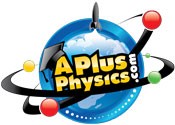
Tag Archives: Regents Physics
Intro to Regents Physics

Regents Physics Exam Prep Resources #physicsed #regents #physics
As we close in on the end of our year in high school physics, I thought it’d be helpful to myself (and perhaps to others) to put together a compendium of some of the best Regents/Honors Physics resources to assist students in preparing for their final exams. Without further ado, and in no particular order:

APlusPhysics: Dan Fullerton’s (my) site to assist students and educators specifically around the NY Regents Physics curriculum, which has been expanding and generalizing to curricula outside the state as well. The Regents Physics section of the site, however, is by far the strongest and most complete. This site includes online tutorials covering the entire Regents Physics course, interactive quizzes pulling from a database of hundreds of old Regents Physics Exam questions, video tutorials of every major topic covered by the exam, and is also tied in quite closely with the Regents Physics Essentials review book. In addition, every Regents Physics questions from the past 16 exams has been pulled into worksheets by topic to allow for highly directed practice.
ScienceWithMrNoon: Brendan Noon‘s physics site has a wide variety of great content, including topic-based interactive quizzes and tons of great physics videos. His course calendar, as well, is loaded with tons of great resources by topic!
St. Mary’s Physics: Tony Mangiacapre‘s site, full of great lessons and interactive simulations across the entire Regents Physics curriculum. I’m especially fond of the Photoelectric Effect simulation — makes for a great computer-based lab activity! This site is also closely linked with Tony’s 123physics.com, featuring more than 1300 Regents Physics Exam questions broken down by topic for students to practice, as well as more great videos.
RegentsPrep.org: The Oswego City School District (with Dr. Tom Altman) has pulled together a strong collection of resources broken into Explanations, Demos, Labs, and Quizzes to assist students and educators in preparing for the Regents Physics exam.
Altman Science: The charismatic Dr. Tom Altman provides real-life demonstrations and explanations of physics concepts in action as part of the High School Physics Project. Further, he’s broken down a number of old Regents Exams and walked through solutions to each and every question in video format, page by page. In addition, his laser videos are “wicked cool” as well!
Past Regents Exams: The name says it all — an amazing archive of old Regents Physics exams!
Regents Physics Essentials: I’d feel negligent if I didn’t point out the Regents Physics Essentials review book I put together at student urging a few years back. There are a number of great review books to help students get ready for the exam, but this book takes a slightly different twist by providing students a straightforward, clear explanation of the fundamental concepts and more than 500 sample questions with fully-worked out solutions directly integrated in the text. As stated by my physics teaching cohort in crime at our high school, “the best review book is the one students will actually use,” and this was written to be friendly, fun, and concise. Plus, if students/teachers want extra problems without solutions given, the worksheets are available free online! You can check out the book’s free preview on APlusPhysics or use Amazon’s “Look Inside” feature!
Regents Test Prep: Get Your Review Books!
It’s that time of year — the Regents Physics Exam is rapidly approaching. Now is a great time to pick up a copy of APlusPhysics: Your Guide to Regents Physics Essentials. You can find it in popular bookstores as well as online at Amazon.com.
“Very well written… simple, clear, engaging and accessible. You hit a grand slam with this review book.” — Anthony, NY Regents Physics Teacher.
“Does a great job giving students what they need to know. The value provided is amazing.” — Tom, NY Regents Physics Teacher.
“This was tremendous preparation for my physics test. I love the detailed problem solutions.” — Jenny, NY Regents Physics Student.
“Regents Physics Essentials has all the information you could ever need and is much easier to understand than many other textbooks… it is an excellent review tool and is truly written for students.” — Cat, NY Regents Physics Student.
“This book felt like I had a teacher/professor talking right next to me with slight humor thrown in… it lists great real world examples for every aspect of physics.” — Jake, Physics Enthusiast.
Now available for electronic devices such as iTouch, iPhone, iPad, Android, and Blackberry through the Kindle store.
Regents Physics SBG Objective Tracking Sheets
10 Quick Tips to Maximize your Regents Physics Score
Although by no means an exhaustive list, these 10 quick tips may help you secure that extra point or two on your upcoming Regents Physics exam.
- Mass and inertia are the same thing.
- To find the resultant, line your vectors up tip-to-tail, and draw a line from the starting point of the first vector to the ending point of the last vector.
- Any object moving in a circular path is accelerating toward the center of the circle.
- Acceleration of an object is equal to the net force on the object divided by the object’s mass.
- The normal force always points at an angle of 90° from the surface.
- Opposite charges and magnetic poles attract, likes repel.
- Gravitational forces and electrostatic forces both follow an inverse square law relationship, where the strength of the force is related to one divided by the square of the distance between the charges/masses.
- The force of gravity on an object, commonly referred to as weight, is equal to mg, where g is the gravitational field strength (also referred to as the acceleration due to gravity).
- The mass-energy equivalence can be calculated using E=mc^2. If a mass is given in universal mass units, however, you can do a straight unit conversion using 1u = 931 MeV.
- Protons and neutrons fall into the category of baryons, which are hadrons. Smaller particles, such as electrons, fall into the category of leptons. Mesons are rare, weird particles you probably haven’t heard of.
Most importantly, use your reference table. When in doubt, write down the information you’re asked to find, what you’re given, and use your reference table to help you narrow down what you should be doing. In the free response part of the test, make sure to show your work in detail with a formula, substitution with units, and an answer with units.
Find these and many more tips for success at APlusPhysics.com.
APlusPhysics Regents Course Tutorials Completed!
Whew! It’s been a long and challenging project, but I am thrilled to announce that the APlusPhysics.com Regents Physics course tutorial has been completed (well, at least the first revision). I’ve been done with the tutorial less than 20 minutes, and already I’m making notes on additions, modifications, and enhancements, but I think it’s worth taking a moment to step back and look at everything that’s been accomplished.
A year ago I had never created a web page, and didn’t know the difference between HTML and ELMO. But, with a vision to create a resource specific to the needs of the students I see every day, and with the support of friends and family, I started picking up books, reading web articles, and making many, many designs on paper to script out what I wanted to build.
As of this morning, with the upload of a question bank of more than 500 Regents Physics questions from past years, I’m amazed at how much has been created. The APlusPhysics Regents Tutorials include objectives, explanations, sample problems, FLASH animations, integrated quizzes, videos… just about everything you could ask for in an online resource tailored to a specific course.
So what comes next? I’d like to continue my work to pre-record video lessons of all the major topics in the Regents Physics course, with the ultimate goal of spending in-class time working on hands-on lab activities, as well as supporting students individually and in small groups, and minimizing the less-effective entire-class-instruction time. Second, several students have inquired as to whether I might take the course content material on APlusPhysics and expand it into a written mini-book / synopsis for the Regents Physics course. Though initially hesitant, the more I think about it, the more I find value in creation of the written “APlusPhysics’s Guide to Regents Physics.” And oh, by the way, did I mention the list of website enhancements I’ve already started on?
The question, then, is where to start. As much as I try to deny it, I know I’ll be working on website revisions by tonight, in tandem with my next project. So which to tackle next, the video mini-lessons, or the printed guidebook? Or both? Would love to hear your feedback and thoughts!
And, as with any endeavor of such scale, allow me to again thank all my supporters, students, colleagues, family members and contributors. This is a huge milestone for APlusPhysics and the culmination of hundreds of hours of frustration and effort, which has already paid for itself in personal learning and confidence. I’ve come out all the better for it, and I hope this resource helps others say the same.
